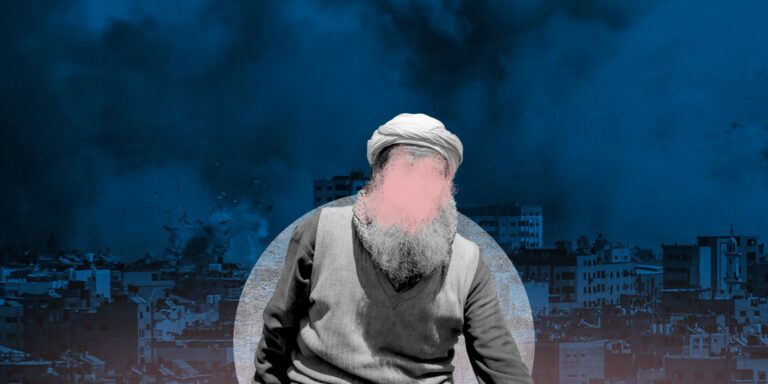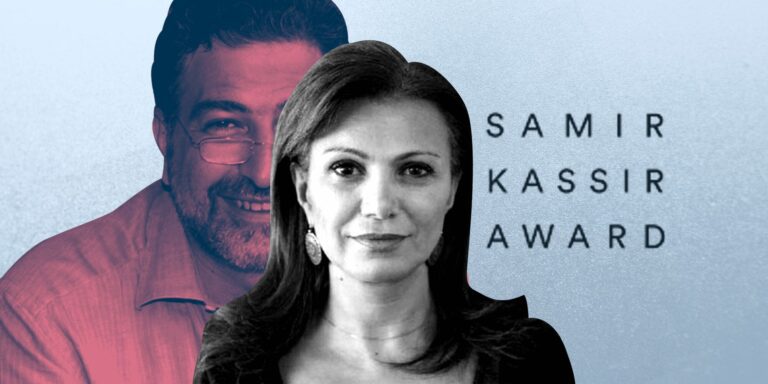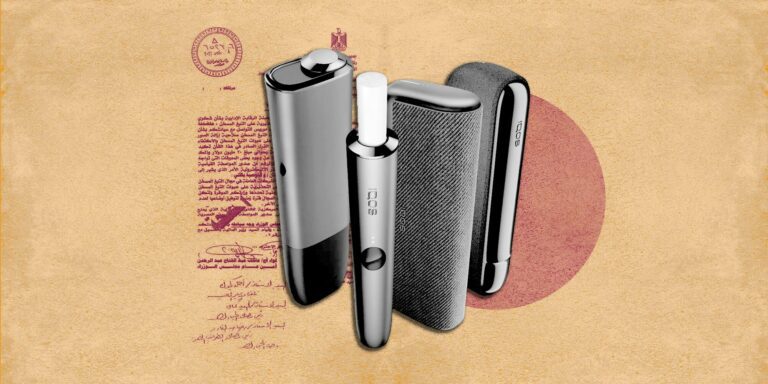He tosses and turns in his bed placed on the floor, then extends his right fist to his neck and clenches it, before quickly striking the floor of the room and pointing with his fingers to a cup of water placed on a nearby table, prompting his brother to quickly hand it to him.
After a few sips of water, Othman Mohammed, 42, says in barely understandable broken words: “It feels like acid is going down my throat.” The car mechanic, who is suffering from cancer, lives in the district of Kalar in northern Sulaymaniyah, where primitive oil refineries are abundant. He groans and, after taking a deep breath and trying to extract the words, repeats: “I no longer have the strength to resist it… it will not leave me until it kills me… there is no escape from that.”
In the second half of 2018, and quite suddenly, Othman’s throat started to experience unusual pain, leading him to undergo several medical tests, with the results forcing the doctors to confront him with the truth of his diagnosis with “second-degree thyroid cancer.”
Thus, the life of “Ustaz Othman,” as he is known in Kalar, turned upside down in just a few days. The disease made the well-known car repairman in the town completely unable to work, with the the endless treatment sessions turning him into hospital stays regular which he barely leaves.
Accurate diagnosis revealed the presence of 21 malignant cancerous nodes in his neck, 19 of which were successfully removed through complex surgical interventions, leaving two malignant nodes (4-5 mm in size) that still threaten his life, according to his doctors.
Since the discovery of the disease, Othman has continued his long and costly treatment journey with “strong willpower,” which he pursued in three countries: Turkey, Iran, and India. However, as he says, he feels discouraged every time he returns from a treatment trip when he sees the smoke clouds rising from the oil refineries, sometimes forming clouds that envelop his residential area with their toxins.

Diler, a university graduate working as a taxi driver who accompanied us on a tour of oil refineries in the Garmiyan administration areas that include Kalar, says there are eight oil fields spreading their toxins here.
He adds in a sharp voice, while tightly closing the window of his car and pointing to a black smoke trail extending into the horizon: “This, with its smoke that fills the sky, is what is killing us… How can patients recover amidst the clouds of toxins surrounding them?” He mutters as he wipes the sweat from his forehead, “We have received nothing but harm from it; even our agricultural lands have been damaged.”
Othman is not the only one in his family affected by this; in fact he is the eighth. Two of his younger brothers are also affected, one aged 43 and the other 42, along with seven others among his nieces, nephews, and relatives, all living in the same deadly environment as he describes it: “If thorough examinations were conducted on the region’s inhabitants, we would discover the extent of the catastrophe we are living in, with primitive refineries emitting their toxins day and night without any treatment.”


Rapid Increase in Cases
In 2019, the total number of cancer cases in the Kurdistan Region reached 7,831, and the recorded numbers decreased to 6,293 during the COVID-19 pandemic in 2020, according to the Ministry of Health in the Kurdistan Government, due to the decline in visits to medical institutions and the reduction in vehicle movement on the streets.
However, the recorded cases in Kurdistan, with an estimated population of 6 million, rose again to over 8,000 cases in 2021, 9,061 cases in 2022, and 9,911 new cases were diagnosed in 2023.
According to international standards, 191 cancer cases are diagnosed per 100,000 people. Although the region diagnoses 151 cases per 100,000 people, the recording of nearly 10,000 new cases each year and the annual increase rate that does not align with population growth rates put the region in a critical situation, as specialists say, given the shortage of specialized hospitals and the difficulty in obtaining some necessary treatments.
Official statistics from the Ministry of Health in Kurdistan indicate that 81,062 cases have been diagnosed between 2012 and 2023.
Dr. Jinar Ali, the head of cancer control at the Ministry of Health in Kurdistan, says that breast cancer patients top the list of registered cases in the region, followed by cases of colon cancer, then lung cancer, skin cancer, lymphoma, prostate cancer, leukemia, brain cancer, artery cancer, thyroid cancer, and oral and gum cancer.


Areas of Concentrated Cases
Doctors confirm that a simple regional sorting of the patients reveals a map of cancer case distribution in Kurdistan, which indicates a concentration in areas suffering from high environmental pollution rates due to the proliferation of oil fields and refineries.
To verify this information, and given the difficulty in obtaining detailed information about the patients and their areas of prevalence, in the absence of precise documentation and the refusal of some health institutions to disclose it, we took random samples of registered patients at the Hiwa Hospital in Sulaymaniyah, the largest center specialized in cancer treatment in the Kurdistan Region.
The sample included 50 cancer patients of both genders from all areas of Kurdistan, comprising 30 men, 20 of whom are under 45 years old and 10 over 45 years old, and 20 women, 10 of whom are under 40 years old and the others over 40 years old.
The sample covered the three governorates of the Kurdistan Region (Erbil, Sulaymaniyah, Duhok) and the results showed that 96 percent of the cancer patients live near oil fields and refineries at varying distances from their homes. Their situation is similar to that of Uthman the mechanic, as an oil field operates at a distance from his home in the Rizgari area of the Kalar district.
Table Clarifying the Sample Details
| Sample Number | Out of a Total of 50 | Percentage (%) |
| Number of men | 30 | 60 |
| Number of women | 20 | 40 |
| Number of affected individuals (men & women) who live near oil refineries | 48 | 96 |
| Number of affected men who live near oil refineries | 30 | 100 |
| Number of affected women who live near oil refineries | 18 | 90 |
| Number of men who are under 45 | 20 | 66.6 |
| Number of men who are over 45 | 10 | 33.3 |
| Number of women who are under 40 | 10 | 50 |
| Number of women who are over 40 | 10 | 50 |
The analysis of the sample showed that Sulaymaniyah Governorate topped the governorates of the region in terms of the number of cases, followed by Erbil and then Duhok.
Another Source of Danger
In addition to the emissions from oil refineries operating outside specifications, doctors and environmental specialists warn of the dangers posed by emissions from electric generators spread within residential neighborhoods. These generators use locally produced diesel fuel (gas oil) of very poor quality.
One person who works in the production of this material says that it is produced in some primitive refineries by mixing black oil and expired car fats with acid and other components. The cheapest and therefore the poorest quality types are chosen to reduce costs.
This happens in the complete absence of environmental monitoring of the production in these refineries and the emissions from the electric generators which spread within residential neighborhoods. This is due to the impossibility of doing without their operation since government institutions cannot provide electricity for more than 12 hours a day.
Another source of pollution is the car gasoline produced by these refineries. With more than two million cars in Kurdistan, most of which use poor and highly hazardous fuel, the problem is compounded.
Economic expert Dr. Karwan Hama Saleh says that the gasoline and gas oil used to operate cars and generators, produced without oversight and of poor quality, undoubtedly carry serious environmental and health risks.
He explains that more than 90 percent of the gas oil used to operate generators is produced in refineries by mixing crude oil with car paint and the locally named substance, naphtha. Acid is then added to change its color from brown to yellow before it is marketed.
Operating Illegally
Hundreds of medium and small oil refineries have appeared in the Kurdistan Region over the past twenty years, alongside large refineries owned by influential figures in the ruling parties. The smaller and less productive refineries have disappeared in the last ten years, while the others have continued, which former parliamentarians currently estimate to be more than 200 refineries.
Most of these refineries operate without official legal licenses. However, they buy oil from the government and refine it in primitive ways that do not adhere to even the minimum global production specifications and do not apply public health and safety standards, neither in terms of geographical location nor working methods.
In Erbil, these refineries are spread in the areas of Koshtepa, Kower, and Shamamak. In Sulaymaniyah, they are found in the Tanjaro area southeast of the governorate. In Duhok, they are concentrated in the Kashi area west of the governorate.
With the emergence of these refineries, which pollute the air and produce poor derivatives, the number of cancer cases has doubled, according to staff in medical institutions and environmental organizations.
Maruf Majid, head of Aynde, an environmental protection organization, confirms that many of these refineries operate outside legal frameworks. He notes that according to Law No. 8 of 2008 on Environmental Protection and Improvement in Kurdistan, any company or project causing environmental pollution must compensate the affected areas. However, he expresses regret that this is almost never implemented.
The head of the organization points out one of the problems caused by this industry, which does not consider the environment or public health: the transportation of oil derivatives in unqualified tanker trucks in traditional ways between the governorates and different areas, especially in Chamchamal and Darbandikhan in Sulaymaniyah. He refers to an incident in early April in the Dokan district, where an accident caused the transported oil to leak into drinking water, leading to its contamination and subsequently cutting off drinking water for several days in many parts of the governorate.
Pollutants in the Water and Air
In Kurdistan, there are many pollutants in the water, soil, or the air. The air particularly suffers from high levels of sulfur oxides, nitrogen oxides, carbon oxides, and hydrocarbons resulting from fuel combustion processes in refineries, oil fields, power generation units, and fuel-burning factories, according to Dr. Abdulmutalib Rafat Sarhat, an environmental sciences expert and faculty member at the University of Garmian. Additionally, there are other pollutants such as the smoke from primitive solid waste burning and emissions from over two million cars operating in the region.
Sarhat states that “the pollutants contribute to the increasing spread of cancer and other diseases.” This is confirmed by the head of the Energy and Natural Resources Committee in the previous Kurdistan Parliament, Ali Hama Saleh, who says that refineries and the gas oil used to operate generators in residential neighborhoods have “significantly increased environmental pollution, which has doubled cancer rates in recent years.”
Saleh explains, based on surveys and scientific studies he reviewed that, “in 2016, there were 12 new cases of the disease recorded daily, but this number rose to 41 daily cases by the end of 2022.” He expects that “the number could reach 100 cases per day in the coming years if pollution sources remain unaddressed.”
The former Kurdish MP points to what he describes as the “shocking corruption” in the operation of unofficial oil refineries, which produce poor-quality gas oil for electric generators, while the gas oil that meets international standards is smuggled from official refineries such as “Lanaaz, Bazian, and Kalak” outside the region.
Saleh warns of the significant health risks of the current production methods: “Every day, around 5 million liters of white oil are mixed with car oil residues and some petrochemical substances.”
In 2022, with the increasing complaints reaching MPs in the Kurdistan Parliament regarding pollution, Hama Saleh tasked a group of specialists with conducting laboratory research on samples of these products in advanced laboratories in Turkey.
The result was “very shocking,” Saleh says: “They are completely unsuitable for use,” likening their use in operating generators to “putting poison in the respiratory systems of the region’s citizens.”


Waste Discharged into the Soil
Dr. Abdulmatlab Rafat Sarhat emphasizes that these materials have turned the land of Kurdistan into a center for the spread of epidemics and chronic and dangerous diseases.
He explains: “This happens through the emission of gasses such as carbon monoxide, carbon dioxide, methane, hydrogen sulfide, sulfates, nitrogen oxides, along with components of crude oil and fumes, which are inhaled by the citizens.”
The environmental science expert adds, “Another aspect involves the cultivated crops and soil, in addition to their mixing with surface water and seeping into groundwater, thereby entering the food chain, which constitutes an additional factor for disease.”
He points out that Iraqi law prohibits gas burning within six miles of residential areas, “yet most fields and refineries do not adhere to this distance and do not employ scientific methods for waste disposal. They discharge waste into the soil, including heavy metals known to cause cancer, such as mercury, lead, and arsenic, which are present in large quantities in oil waste.”
Sarhat confirms the danger of refineries violating the basic conditions for their establishment, the most important of which is staying away from populated areas and not being built on agricultural lands, in addition to adhering to high production standards.
Sarhat says that recent years have seen a significant increase in ultrafine particulate matter (PM2.5). When these particles’ levels rise in the atmosphere, their risks increase. He explains that oil refineries are one of the main sources: “These particles appear in the air, penetrate the respiratory system causing irritation, and often enter the bloodstream through the alveoli, increasing their danger and leading to blood and respiratory system cancers.”
Over One Billion Dollars in Profit
There are four official refineries in Kurdistan, two of which (Kalak and Lanaaz) are near Erbil, while the Bazian refinery is in Sulaymaniyah, and the Tawke refinery is in Duhok. The first three refineries are managed by Kurdish party companies, and the fourth is managed by a Norwegian company.
Dr. Ghalib Mohammed, former chairman of the Energy Committee in the Sulaymaniyah Provincial Council (2014-2018) and member of the Oil and Gas Committee in the fourth session of the Iraqi Parliament (2018-2021), confirms that the official refineries in the region produce gasoline and gas oil with high specifications, but a large part of their output is exported outside the region.
While high-quality production is exported, the poor-quality fuel is sold in Kurdistan, generating “huge profits” for refinery owners, according to MP Mohammed, who estimates the annual profits of unofficial refineries at more than one billion dollars “going into the pockets of the influential and decision-makers.”
Mohammed echoes what MPs and experts often say, that these refineries “produce carcinogenic and prohibited materials and are responsible for the increasing cancer rates in Kurdistan.”
He points to what he describes as the “most dangerous harm” to citizens’ lives, which is the disposal of refinery waste by dumping it into the soil or rivers, such as the Sirwan River, a tributary of the Tigris River, whose waters flow into the Darbandikhan Dam in Sulaymaniyah province, providing about 75 percent of the dam’s water supply and irrigating more than 200,000 km² of agricultural land.
The waters of the Dukan and Darbandikhan dams, which suffer from pollution, are among the main sources of drinking water for citizens in Sulaymaniyah and its surrounding districts and sub-districts.
Increasing Despite Their Illegality
Forty-year-old Hassan Kobani, who lives in the Germian administration area within Sulaymaniyah province, is one of the thyroid cancer patients in the region. He blames the pollutants from oil refineries in his area for his illness and that of some of his relatives. Health institution figures indicate an increase in the number of cases there compared to other areas.
Kobani was a member of the Kurdish Peshmerga forces before being retired due to a missile injury during a confrontation with ISIS fighters in November 2014 in the Kobani area in northern Syria. He was part of the first Peshmerga military unit to enter the region to help its residents confront the organization, and from there, he got his nickname.
That injury left Kobani bedridden due to 12 shrapnel pieces scattered throughout his body, but his suffering increased further after he was diagnosed with cancer in 2021, the same disease his brother also contracted.
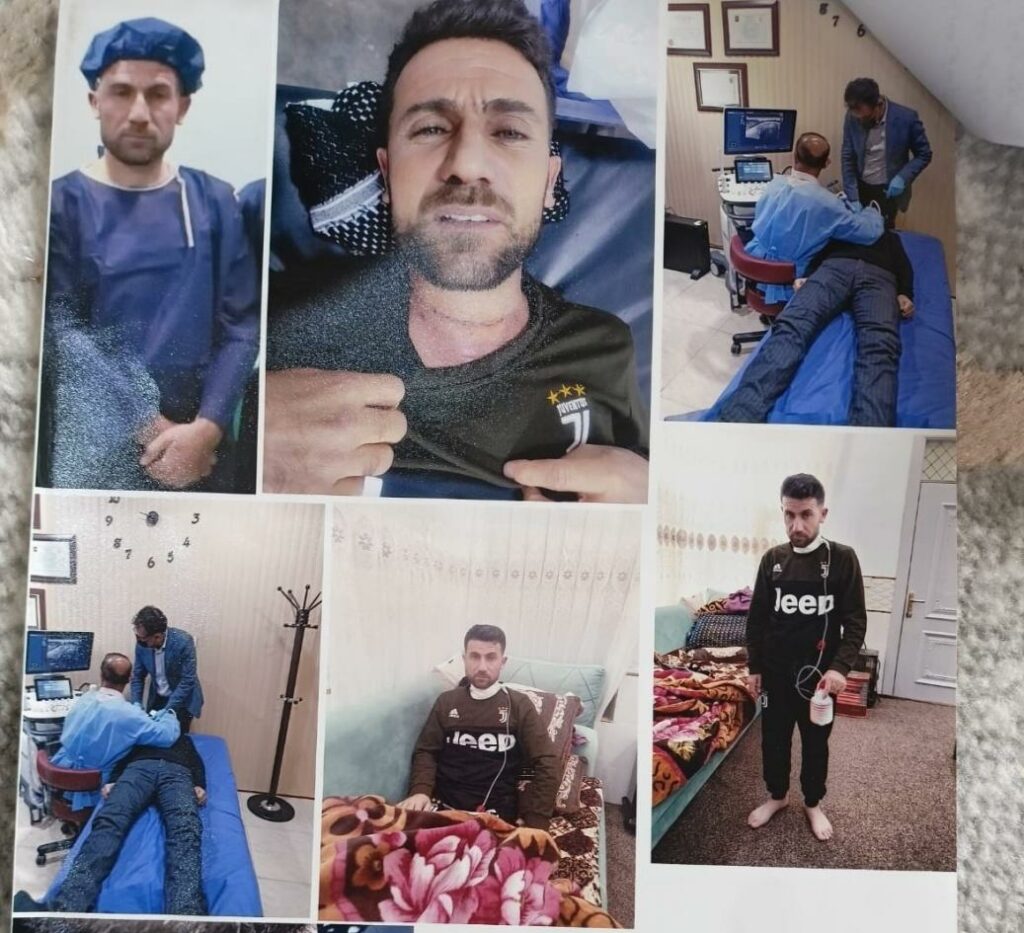

Among more than 200 unofficial oil refineries in Kurdistan, former member of the regional parliament’s financial committee, Omar Kolby, reveals that “about 100 of them are in Erbil. He explains that out of 30 refineries, only three have the approval of the Environmental Department, while the rest do not meet the required specifications and conditions.”
However, a member of the Erbil Provincial Council, who refused to be named for personal reasons, says that the number of unofficial refineries in Erbil was about 106 in 2015, and increased to about 140 in the past six years, mostly located outside the cities on the road connecting Erbil to Kweer district and between Erbil and Duhok.
These refineries supply the needs of 2,200 generators scattered in residential neighborhoods in Erbil province, according to statistics obtained by the investigator from the head of the Erbil Generators Council, Qarman Molod.


In Sulaymaniyah, the number of electric generators exceeds 2,000 generators, making it the main consumer of the products of its refineries. The province needs about 3.3 million liters of kerosene daily to cover its needs in operating factories, facilities, and other facilities, as well as 2.2 million liters of gasoline.
As for Duhok, there are 44 oil refineries, warehouses, and fuel depots, of which 36 are unlicensed and are in the Kashi area, according to Kolby, with most of them operating outside the required specifications and conditions for the safety of nearby residents and environmental preservation.




A government source in Duhok confirms that some of these primitive refineries were shut down at the end of 2022 due to repeated complaints from residents and the failure to receive crude oil from the Ministry of Natural Resources in the Kurdistan government. However, local sources have indicated that most of these refineries have resumed operations periodically.
The total number of electric generators in Duhok is about 5,000 generators, including those used in all civil and governmental facilities, including 2,100 generators within residential neighborhoods, according to Hikar Hirouri, a representative of the Duhok Generators Association.
Duhok needs about 2.2 million liters of kerosene daily to cover its daily needs for operating various factories and facilities, as well as 1.8 million liters of gasoline to cover its various needs.
Despite the ongoing complaints about the poor quality of fuel used in Kurdistan and its health risks according to specialists, the production of these refineries finds its way to generators and cars, away from any accountability, under what former deputy Ali Hamah Saleh calls “rampant corruption,” which obstructs the inspection procedures of the substance in the relevant laboratories because the tests will prove “its non-compliance with safety requirements.”
Taking into account the quantity of gas oil used in operating the generators spread within residential neighborhoods alone, which amounts to about 6,300 generators, operating for more than 12 hours per day during both the winter and summer seasons, and with each generator consuming more than 150 liters per hour of operation, it appears that the production of these refineries of poor-quality fuel that pollutes the air and soil exceeds 11 million liters daily to meet the needs of generators, in addition to the requirements of factories and some other facilities. Meanwhile, the region consumes about 5 million liters of gasoline, most of which is produced by primitive refineries that do not comply with the required specifications.
Oil and energy expert Bahjat Ahmed identifies the reasons for the poor-quality gasoline produced and used in the region, explaining that only four refineries in Kurdistan own a unit for the naphtha isomerization process, which is the primary product after crude oil refining, into gasoline of different qualities, ranging from regular to improved or super.
He says: “The rest of the refineries in the region do not have the isomerization unit, so traders buy naphtha from small refineries and mix it with other materials imported from Iran known as ‘improvers,’ and the quality of the produced fuel depends on the percentage of the entering improvers: mixing 25 percent of the improvers with naphtha produces regular gasoline, and the quality improves with the increase in percentage, but this means raising the cost of the price per liter, so we find that most of the product is of poor quality.”
A table that clarifies the number of cars and how much gas they need in Kurdistan according to a 2022 survey acquired by this report’s investigator
| Governorate | Number of Cars | Percentage (%) | Daily Required Amount of Gas (gallons) | |
| 1 | Erbil | 946,094 | 51.4 | 2,571,409 |
| 2 | Sulaymaniyah | 616,136 | 33.5 | 1,674,609 |
| 3 | Duhok | 277,411 | 15.1 | 753,981 |
| 4 | Total | 1,839,641 | 100 | 4,999,999 |
Decisions to Shut Down and Failure at Executing
Decisions to close unofficial refineries in Kurdistan have been issued over the past years due to the environmental disasters they cause. However, these decisions have been implemented only to a limited extent, according to government officials, due to the influence of certain entities behind these refineries and the significant monthly revenues they generate, some reaching millions of dollars.
On September 15, 2015, the Minister of Natural Resources in the eighth cabinet of the Kurdistan Regional Government (2014-2019), Ashti Hawrami, issued a decision to close more than 160 unauthorized refineries operating outside the required safety conditions.




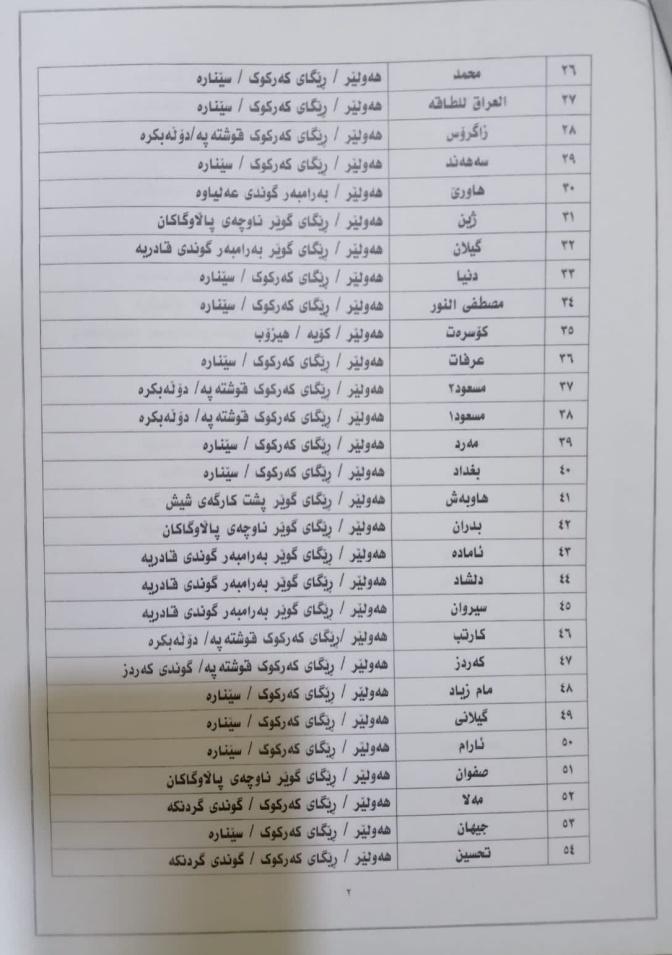





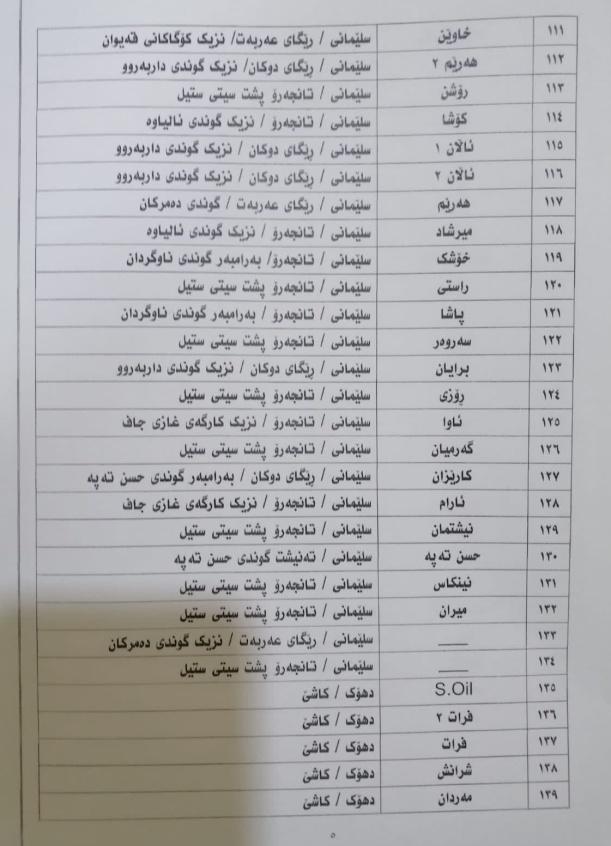



Decisions to close unofficial refineries in Kurdistan have been issued over the past years due to the environmental disasters they cause. However, these decisions have been implemented only to a limited extent, according to government officials, due to the influence of certain entities behind these refineries and the significant monthly revenues they generate, some reaching millions of dollars.
On September 15, 2015, the Minister of Natural Resources in the eighth cabinet of the Kurdistan Regional Government (2014-2019), Ashti Hawrami, issued a decision to close more than 160 unauthorized refineries operating outside the required safety conditions.
On October 16, 2018, the former Minister of Interior in the region, Karim Sinjari, issued a warning to one of the oil refineries in Duhok, ordering the closure of the refinery and the removal of its residues within a maximum period of 60 days, with failure to comply leading to legal accountability.
However, a member of the Duhok Provincial Council, who preferred not to be named for personal reasons, confirmed that the majority of unofficial refineries continued to operate even after the issuance of this warning and others.
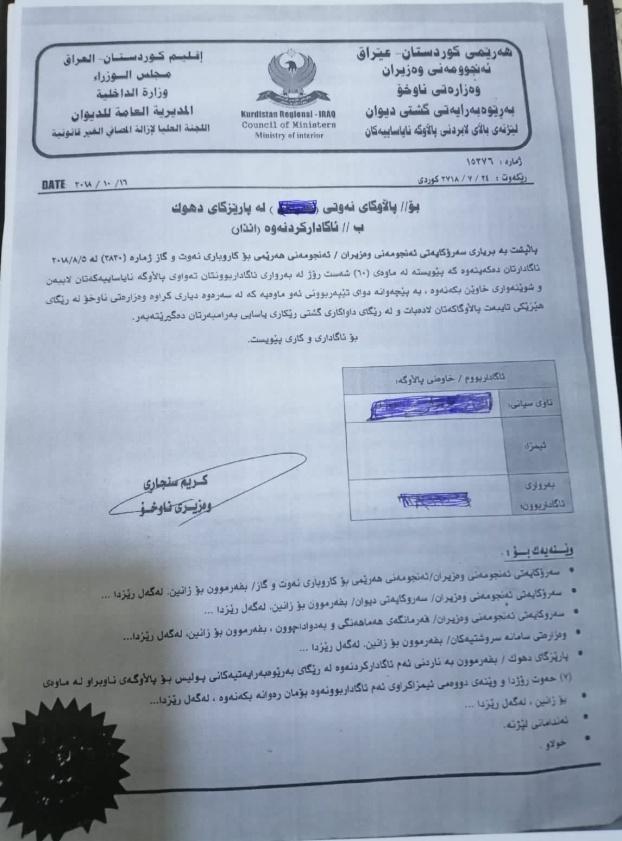

In 2018, the Oil and Gas Council of the Kurdistan Regional Government issued a decision to close all unofficial and unauthorized refineries, but the decision was not implemented.
On March 24, 2019, the Ministry of Interior in the Kurdistan Regional Government made another attempt through its letter No. 5436 to enforce the closure of unofficial refineries. This effort was to be supported by forming a joint security force composed of approximately 50 officers and employees in each province of the region.
However, this effort also failed to close the refineries, according to members of the Kurdistan Parliament.
Following the previous letter, a document dated June 18, 2019, and signed by former Interior Minister Karim Sinjari, reveals the allocation of 200 million Iraqi dinars to oversee the removal of all illegal refineries. This was to be achieved through the formation of a high committee and subcommittees in each province.


However, a high-ranking official in the Ministry of Interior, who requested anonymity due to the sensitivity of his position, stated that the committee’s activities “never saw the light of day due to party interventions and failed to implement the Ministry of Interior’s decision to remove the unofficial refineries.”
The failure to implement the Ministry of Interior’s decisions is confirmed by documents issued by the government itself. After a letter from the Energy Committee in the Sulaymaniyah Provincial Council was sent to the council president on June 18, 2019, requesting him to direct a letter to the governor to enforce the Ministry of Interior’s decision issued on November 21, 2018, to remove the unofficial refineries located in the Tanjaro area due to their negative environmental impact, the council president directed a request to the governor to implement the Interior Ministry’s decision. However, the governor responded on July 3, 2019, stating the inability to implement the decision due to the failure to secure the allocated budget of 200 million dinars.
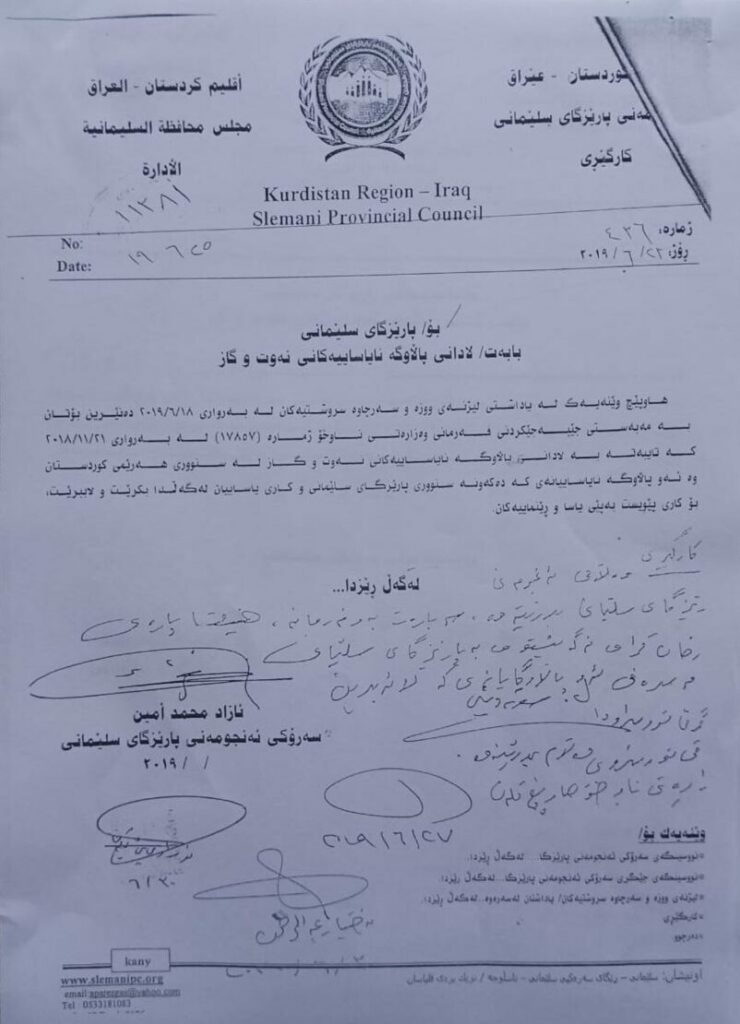

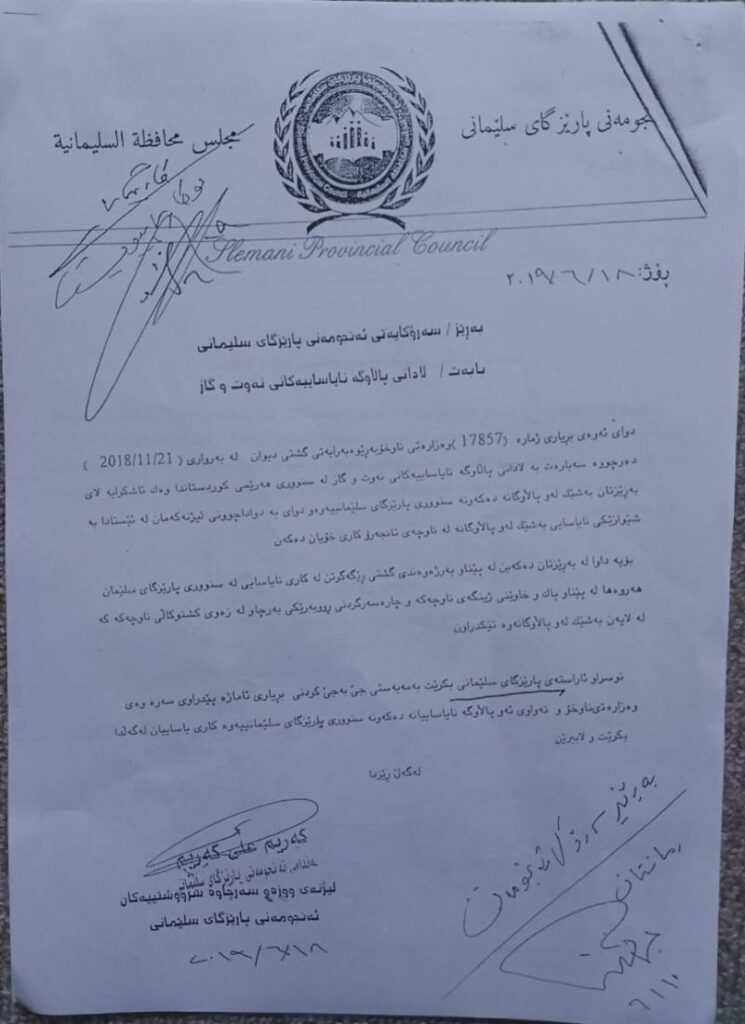



The local Sulaymaniyah government’s inability to remove the unofficial refineries prompted the Energy Committee in the provincial council to send another request to the council president to directly address the Ministry of Interior of Kurdistan to secure the allocated budget for the removal of these refineries “due to the damage they cause to the environment and agricultural lands.”


Following this, the President of the Sulaymaniyah Council addressed the Interior Ministry of the region with a letter issued on February 19, 2020, to take the necessary steps to implement its decision to remove the illegal refineries. However, no actual measures were taken in response to all these requests, according to a member of the Sulaymaniyah Council.
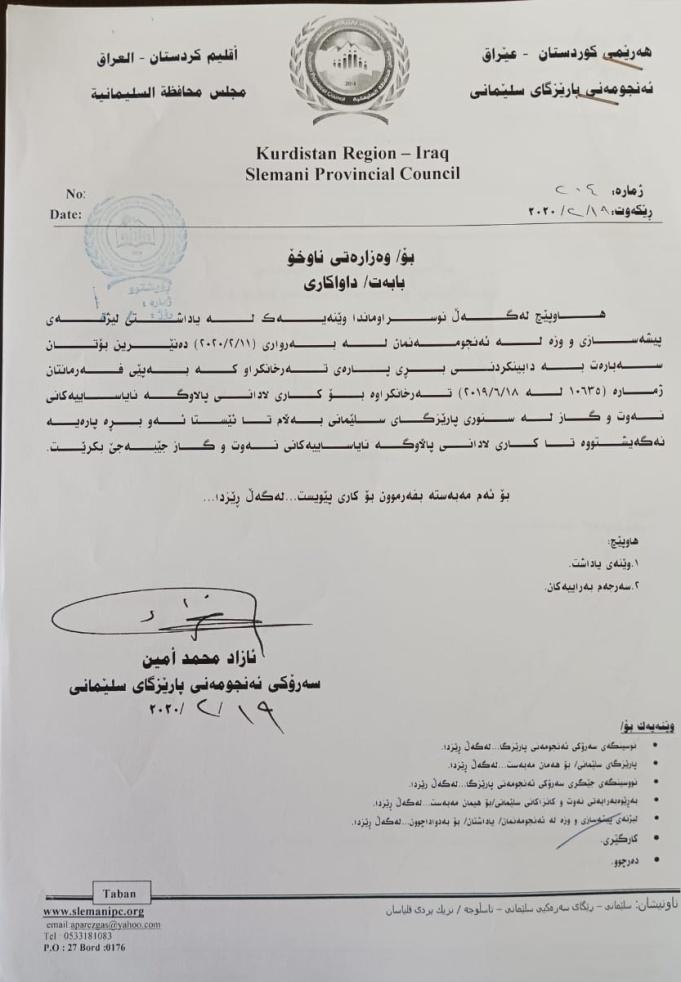

Stronger than the Government
Despite the successive government decisions to remove illegal refineries due to the threat their products pose to human life and the environmental damage they cause, which is difficult to remedy, the entities managing these refineries have successfully blocked all government decisions. This has proven that they are stronger than the decisions of the ministries and relevant institutions.
Commenting on this, former member of the Energy Committee in the Sulaymaniyah Provincial Council, Karim Ali, stated that one month would be enough to remove all these refineries, “but influential entities deliberately ignore the matter,” holding the regional government and local governments responsible for the damage caused to the environment and public life.
At the beginning of 2021, the Kurdistan Parliament issued Law No. (3) concerning the export, storage, and sale of petroleum products in the region. According to the law, the Ministry of Natural Resources in the Kurdistan government was supposed to issue specific instructions for its implementation, which would end the phenomenon of illegal refineries. However, the ministry did not take any actual steps in this regard.
Former MP Omar Kolbi explains this by stating that “most of these refineries are backed by influential officials, which prevents their closure, while the Ministry of Natural Resources remains silent about their legal violations.”
The owners of these refineries, with whom the investigation’s author communicated, justify their continued operations by ensuring jobs for thousands of people in the region, which is suffering from an economic crisis. Additionally, “their products are sold at lower prices compared to global prices, compensating for the cost of imports and saving tens of millions of dollars.”
Former member of the Energy and Natural Resources Committee in the regional parliament, Sherko Jawdat, acknowledges that the reason for not closing these refineries is that they “belong to influential entities, which supports their continued operation despite the recorded violations.”
Jawdat adds: “Official entities have counted 214 unlicensed refineries. Over the past years, we have received many complaints about their operations and research confirming their health risks. We have conveyed this to the highest authorities in the region, but to no avail.”
Pressure Induced by Increased Cancer Rates
The problem of increasing environmental pollution coincides with climate change in the Kurdistan region, which has exacerbated environmental issues due to declining rainfall rates between 2020-2023. Additionally, the “financial deficit” the region has faced since 2014 has impacted the health sector allocations, leading to a significant shortage of life-saving treatments and medications in public hospitals, including cancer drugs.
Former MPs from various parliamentary committees and health specialists, such as Dr. Yad Naqshbandi, Director of Hiwa Cancer Hospital, warns that the current state of the refineries poses a “grave danger” to the lives of Kurdistan’s citizens and that “the danger will increase in the coming years with the accumulation of environmental pollutants.”
In 2022, Hiwa Cancer Hospital recorded more than three thousand cancer cases, while in 2023, more than 10 new cases were recorded daily.
According to Dr. Yad Naqshbandi, 80 percent of the cases are from Sulaymaniyah, Halabja, and the administrations of Garmian and Raparin, with the remaining percentage coming from other cities in the Kurdistan region and Iraq in general. Approximately 800 patients visit the hospital daily.
He states that “some treatments cost around $6,000 per month and are provided for free, which creates significant financial pressure to secure the increasing requirements amidst rising cases.”
Dr. Naqshbandi criticizes the lack of any early detection center for the disease in Kurdistan. “If the situation continues as it is now, and the infection rates keep rising, we expect that in 10 years, the infection rates will reach a level that all of Kurdistan’s annual financial budgets will be unable to meet the patients’ needs.”
Hiwa Hospital, established in Sulaymaniyah 17 years ago, is the first specialized cancer hospital in Kurdistan. It secures a large part of its requirements through donations from benefactors and treats patients from several provinces outside the region. This puts it under constant pressure, occasionally facing stoppages and funding difficulties due to the financial crisis in the Kurdistan region.


Alongside Hiwa, the Awat Center for Radiotherapy was established in Erbil to address the rapid rise in cancer cases in the city over the last seven years relative to the population. In 2022, approximately 1,500 new patient records were opened at the center, with around 170 patients visiting daily for treatment in 2023.
Dr. Biston Safiuddin, the center’s director, reveals that in 2015, there were only 1,300 registered cancer patients in Erbil Province. However, this number increased to 2,800 new cases by 2021.
He indicates that over 23,000 cancer cases were recorded in the city between 2010 and 2022, affirming that environmental pollution from oil refineries is one of the main reasons for the rising cancer rates.
No Insurance and Safety Standards
The investigation’s author visited three refineries in Sulaymaniyah, three in Erbil, and one in Duhok to understand their operations and compliance with standards. However, all administrators and workers refused to comment.
Workers justified their refusal by citing warnings of dismissal if they disclosed any information about the nature of their work, revenues, product specifications, or the parties to which their products are marketed.
An administrative employee at one of the refineries, speaking on the condition of anonymity for fear of losing his job, stated that they couldn’t say anything because both they and health and environmental specialists know their work is done illegally and without adherence to global standards. They especially operate at night, as it is considered to be the prime time for releasing “toxins” into the air and soil.
A senior official from the Ministry of Natural Resources, after several communications, admitted that these refineries, in addition to producing hazardous products, lack basic safety standards. There is no health insurance for workers despite the high risk of injury, with frequent deadly fires.
Refinery owners sometimes make workers sign contracts that absolve them of responsibility if they suffer injury or illness on the job, depriving many workers of their rights. This has led to the deaths of 10 workers in the Kashi area north of Duhok in recent years.
The source from the Ministry of Natural Resources, who spoke anonymously due to the sensitivity of their position, mentioned that each refinery employs between 6-20 workers, totaling about 2,550 people across all refineries. Local workers earn $600-700 monthly, while specialized engineers in refining and oil product production, mostly Turkish and Iranian, earn between $5,000 and $20,000 monthly.
Former Chairman of the Energy Committee in Duhok Provincial Council, Abdulsamad Tili, agrees with previous opinions regarding poor production and lack of safety standards, describing these refineries as “primitive.” He points out that they were established illegally and their damage reaches every household in Kurdistan, threatening the spread of diseases, including serious ones, because their waste is a major cause of cancer.
Tili confirms that influential parties in high administrative positions are behind the continued operation of these refineries despite closure orders from high-level government bodies, including the Ministries of Natural Resources and Interior and the Provincial Councils, since 2014.
The joy of Ronak Khalid, 27 , who lives near the Kashi area where small refineries are prevalent, was short-lived when she gave birth to her first child in 2019. Cancer turned her life into a nightmare, ravaging her frail body, especially with chemotherapy causing her hair to fall out.
Ronak, who suffers from esophageal cancer, says her illness has crushed her dreams and deprived her of even caring for her little girl. “Death is much easier than the pain, weakness, and helplessness I endure… it might take a person away from their loved ones in one swift move, but this kills you a thousand times a day.”
According to Ronak, doctors told her that there was no other reason for her cancer than the environmental pollution from the oil refineries in her area.
The lack of specialized treatment and care centers in Duhok and the despair of overcoming the disease due to its significant financial requirements have led Ronak to consider suicide to end her suffering. However, the sound of her daughter calling her and her dream of watching her grow keep her clinging to life with the hope of recovery one day.
While patients hope for survival through treatments in specialized institutions, dozens join the lists of new patients every week. Some cannot even secure a bed in Hiwa Hospital due to overcrowding or get the necessary treatment due to its unavailability. Meanwhile, the owners of the deadly refineries continue to boost their investments and bank accounts.
One medical staff member, preferring to remain unnamed, stated: “Previously, we had to turn patients away… In light of our polluted environment, which the government delays or fails to stop, many patients in the future will find no place here.”
This investigation was achieved under the supervision of NIRIJ within the context of the Karib project supported by CFI.



